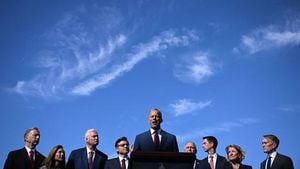Tempers flared on Capitol Hill this week as President Donald Trump’s use of AI-generated videos targeting Democratic congressional leaders ignited a fierce debate over racism, political humor, and the responsibilities of national leadership during a government shutdown. The controversy unfolded in the tense hours leading up to a potential government funding lapse, with lawmakers divided over both the substance and tone of the president’s online messaging.
On October 1 and 2, 2025, Representative Madeleine Dean, a Democrat from Pennsylvania, confronted House Speaker Mike Johnson outside the House floor. Dean’s message was blunt and urgent: Trump’s behavior on social media—specifically, the posting of AI-altered videos depicting House Minority Leader Hakeem Jeffries and Senate Minority Leader Chuck Schumer—was not only unbecoming of the presidency, but also damaging to America’s standing abroad. According to The Economic Times, Dean warned Johnson, “Our allies are looking elsewhere, our enemies are laughing.”
The videos in question, posted by Trump to his Truth Social platform, showed Jeffries, who is Black, wearing a digitally added sombrero and mustache, while Schumer’s voice was manipulated to argue for free health care for undocumented immigrants. Mariachi music played in the background, and the fake Schumer voice declared, “There’s no way to sugar coat it: Nobody likes Democrats anymore.” Dean, visibly frustrated, pressed Johnson: “Is it racist? You put a sombrero on a Black man who’s the leader of the House. You don’t see that as racist? We need you desperately to lead.” As CNN reported, Johnson replied, “It wasn’t my style,” and later added, “I’m working on it. And personally, it’s not my style. I love you and I respect you, OK?”
Dean’s confrontation with Johnson was not her first. The two lawmakers have a history of clashing over partisan issues, and Dean has previously called out Johnson for failing to stand up to Trump’s rhetoric. This time, however, the stakes felt higher. Dean told Johnson that the president was “unhinged” and “unwell,” especially after Trump addressed top U.S. military leaders earlier the same day. Yet, according to Dean, Johnson did not acknowledge her concerns about the president’s mental state.
Speaker Johnson, for his part, sought to redirect attention away from the social media uproar and back to the legislative crisis at hand. In a press conference the following day, Johnson told the press that the AI-altered videos were a “sideshow,” distracting Congress from the urgent business of keeping the government open. “These are games. These are sideshows. People are getting caught up in—in battles over social media memes,” Johnson said, according to The Hill. “This is not a game. We’ve got to keep the government open for the people. I don’t know why this is so complicated.” He even referenced California Governor Gavin Newsom posting a video depicting Johnson as a yellow cartoon minion from the movie Despicable Me, saying he found it hilarious and didn’t respond: “Get to work, do the people’s business, and let’s get on with it.”
But for Democrats like Dean and Jeffries, the president’s posts crossed a line. Jeffries responded on October 1, challenging Trump to direct his insults in person rather than through manipulated videos. “Mr. President, the next time you have something to say about me, don’t cop out through a racist and fake A.I. video. When I’m back in the Oval Office, say it to my face,” Jeffries said during remarks at the Capitol. The White House social media account fired back with a tweet: “Oh no! Hakeem is BIG MAD!” punctuated with laughing emojis.
Vice President JD Vance, meanwhile, defended Trump’s online antics during a White House press briefing on October 2. Vance characterized the videos as “humor,” dismissing Jeffries’ and Dean’s concerns as overblown. “Oh, I think it’s funny,” Vance told reporters. “The president’s joking, and we’re having a good time.” He further offered a tongue-in-cheek negotiation: “I’ll tell Hakeem Jeffries right now, I make this solemn promise to you that if you help us reopen the government, the sombrero memes will stop. And I’ve talked to the president of the United States about that.” Vance’s comments, reported by The Economic Times and The Hill, underscored a deep divide over what constitutes appropriate presidential behavior and the use of humor in high-stakes negotiations.
Speaker Johnson, when pressed by Dean and later by CNN’s Kaitlan Collins, maintained that while he respected Dean as an individual, he disagreed with her perspective on the videos. “I’m the speaker of the House, so I represent Republicans and Democrats in that capacity and I always hear complaints and concerns from members and I always stop and hear that, and I did that for Madeleine Dean. I respect her as an individual, we disagree on every policy matter.” Johnson insisted his focus was on resolving the funding impasse, not policing social media.
The broader context for this heated exchange was the looming government shutdown. As funding negotiations stalled, both parties accused each other of playing politics with essential services. Dean told reporters that Democrats would not provide enough votes to pass the GOP-backed stopgap funding bill without meaningful concessions, such as protections for Medicaid, SNAP, and cancer research. “If you want Democratic votes, you have to put something in the bills that we actually believe in,” Dean said. “We’re not going to give votes—I’m mainly speaking for myself. I’m not going to give a vote over and be complicit on further cuts to Medicaid, to SNAP, to cancer research, pediatric cancer research, Alzheimer’s, nutrition for seniors, for children, for families.”
As the shutdown deadline approached, the dispute over Trump’s videos became a proxy for larger questions about civility, race, and the boundaries of political discourse in America. For some, like Vice President Vance and Speaker Johnson, the memes were a harmless distraction—“games” that shouldn’t derail the serious work of government. For others, including Dean and Jeffries, the videos reflected deeper problems with presidential leadership and the normalization of bigotry in American politics.
With the government’s fate hanging in the balance, the episode served as a stark reminder of how much the tone set by national leaders can reverberate through both domestic politics and America’s global relationships. As Dean warned, “Our allies are looking elsewhere, our enemies are laughing.” The question now is whether Congress can bridge its divides—on policy, on tone, and on the very nature of leadership—before the cost becomes even higher.




